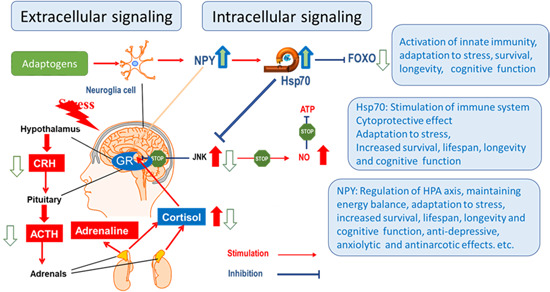Figure 6.

Hypothetical mechanism of action underlying the effects of adaptogens on the adaptive stress response in the hypothalamic–pituitary–adrenal axis: forkhead box O, neuropeptide‐Y (NPY), and Hsp70 signaling. Persistent chronic stress induces and blockage of negative feedback regulation of cortisol and disruption of ATP synthesis. During stress, corticotropin‐releasing hormone (CRH) is released from the hypothalamus, followed by the release of adrenocorticotropic hormone (ACTH) from the pituitary, which stimulates the release of adrenal hormones and NPY. Feedback regulation of overreaction is triggered by cortisol release from the adrenal cortex, followed by binding to glucocorticoid receptors (GRs) in the brain, which halts the further release of brain hormones, resulting in decreases of cortisol to normal levels. Although mild stress (eustress) is a vital part of life, chronic and severe stress can cause depression associated with the production of active oxygen‐containing molecules including nitric oxide, which inhibits ATP formation. The stress‐induced signaling protein c‐Jun N‐terminal kinase (JNK) inhibits GRs. Subsequently, this feedback control is inhibited and the cortisol content in the bloodstream of depressed patients is permanently high, which is associated with impaired memory, decreased ability to concentrate, fatigue, among others. Adaptogens normalize increased cortisol/corticosterone levels in the bloodstream and saliva of humans or animals 12 , 357 presumably due to direct interaction with GRs. Adaptogens also attenuate elevated JNK and cortisol levels during stress and activate the generation of Hsp70, which inhibits JNK. Therefore, the nitric oxide level no longer rises, and ATP production is not inhibited (adapted from authors’ drawings 26 ) [Color figure can be viewed at wileyonlinelibrary.com]
